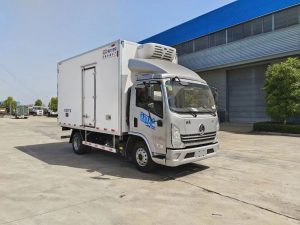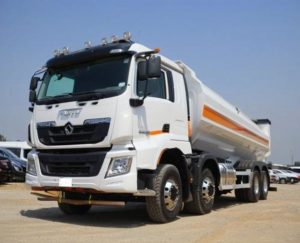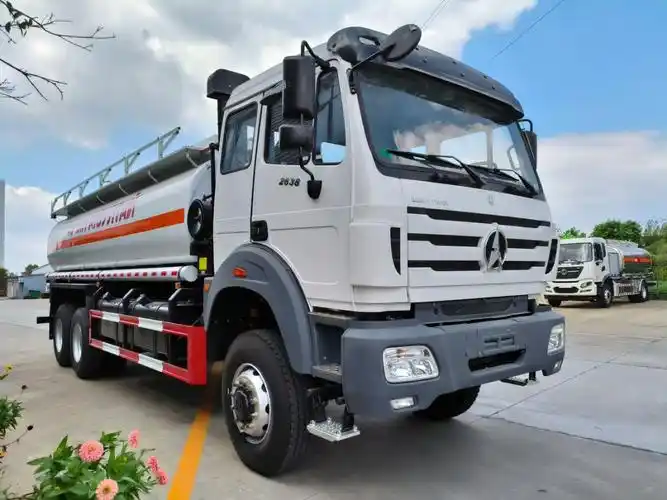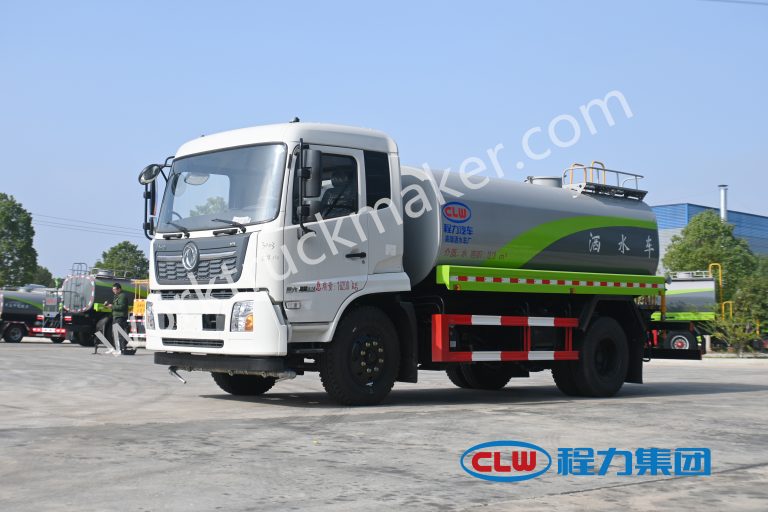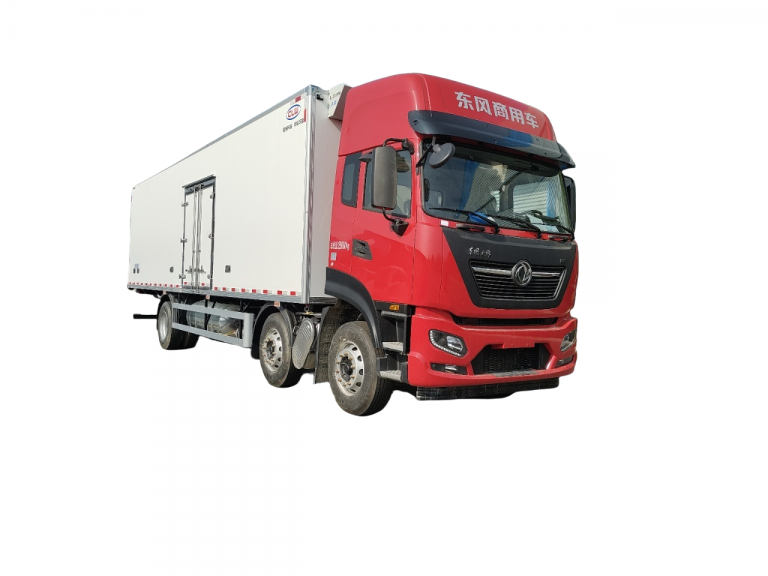Table of Contents
Toggle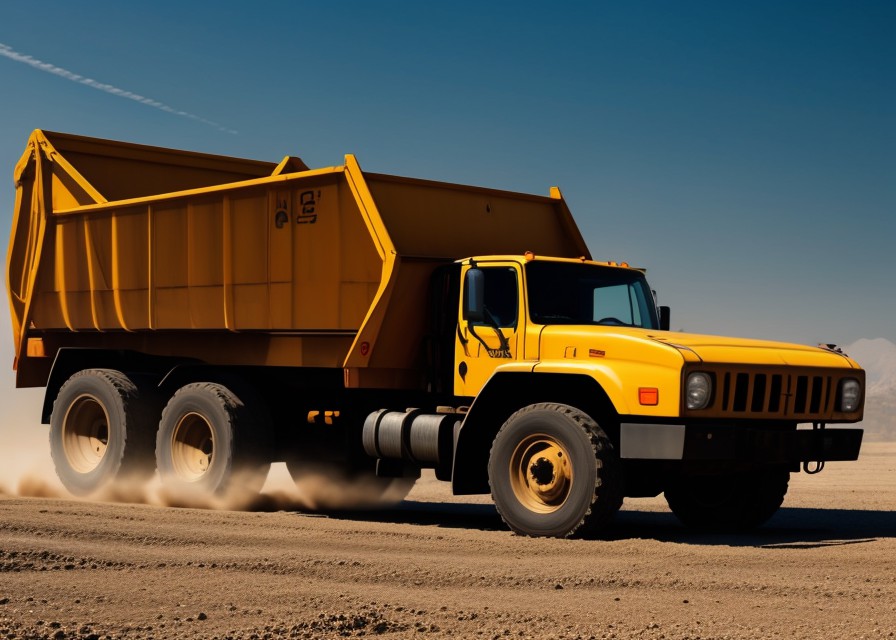
What is a Dump Truck?
If you’ve ever driven by a construction site or a mining operation, you’ve likely seen a dump truck in action. But what exactly is a dump truck? Simply put, it’s a large vehicle designed for transporting loose materials such as sand, gravel, or demolition waste. These trucks are equipped with an open-box bed, which is hinged at the rear and equipped with hydraulic rams to lift the front, allowing the material to be dumped out at the delivery site.
Dump trucks are an essential part of the logistics chain in construction, mining, and various other industries. They come in various sizes and configurations, each designed to handle specific types of materials and operating conditions. The versatility and efficiency of dump trucks make them indispensable for tasks that involve moving large quantities of bulk materials quickly and safely.
Historical Evolution of Dump Trucks
The concept of dump trucks has been around since the late 19th century when horse-drawn carts were fitted with dump mechanisms. These early versions were relatively simple but paved the way for more advanced designs. With the advent of motorized vehicles, the design evolved significantly. The first motorized dump trucks appeared in the early 20th century, and they have continued to evolve with advancements in technology, becoming more efficient and versatile.
In the early days, dump trucks were primarily used in construction and mining operations. However, as industries grew and infrastructure projects became more complex, the demand for more specialized and efficient dump trucks increased. This led to the development of various types of dump trucks, each tailored to specific applications.
Types of Dump Trucks
Standard Dump Truck
The standard dump truck is what most people picture when they think of a dump truck. It has a full truck chassis with a mounted bed that can be raised by hydraulic rams. These trucks are incredibly versatile and can be used for a wide range of applications, from transporting construction materials to hauling waste.
Standard dump trucks are typically equipped with powerful engines and robust suspension systems to handle heavy loads. The hydraulic system used to lift the bed is designed for durability and reliability, ensuring that the truck can perform efficiently even under demanding conditions.
Articulated Dump Truck
Articulated dump trucks are ideal for rough terrain and heavy loads. They have a hinge between the cab and the bed, allowing for better maneuverability. This design makes them particularly useful in mining operations and off-road construction sites where traditional dump trucks might struggle.
The articulated design also allows these trucks to navigate tight spaces and steep inclines more effectively. The flexibility provided by the hinge mechanism helps distribute weight more evenly, reducing the risk of tipping over on uneven ground.
Transfer Dump Truck
Transfer dump trucks are unique because they pull a separate trailer, which can also be loaded with materials. The main advantage is the increased payload capacity. These trucks are commonly used in construction projects that require the transportation of large volumes of materials over long distances.
The transfer mechanism allows for quick and efficient unloading, making these trucks highly efficient for tasks that involve frequent loading and unloading. The additional trailer also provides more flexibility in terms of load distribution and capacity management.
Side Dump Truck
Side dump trucks have beds that tilt to the side to unload materials. This design allows for rapid unloading and reduces the risk of tipping over. Side dump trucks are often used in applications where precise placement of materials is required, such as road construction and landscaping projects.
The side dumping mechanism provides greater control over where the materials are placed, reducing waste and improving efficiency. Additionally, this design minimizes the risk of damage to the truck bed, as materials are less likely to become stuck during unloading.
Off-Road Dump Truck
These behemoths are used in mining and heavy-duty construction environments. They are built to handle extremely heavy loads and rugged terrain. Off-road dump trucks are characterized by their massive size and powerful engines, which allow them to transport large quantities of materials over challenging terrain.
The robust construction of off-road dump trucks ensures that they can withstand the harsh conditions often encountered in mining operations. These trucks are equipped with advanced suspension systems and reinforced frames to handle the stresses of heavy loads and rough terrain.
Key Components of a Dump Truck
Engine
The heart of any dump truck, the engine provides the power needed to haul heavy loads. Modern engines are designed to be fuel-efficient while delivering high torque. Diesel engines are commonly used in dump trucks due to their superior performance and durability.
Advanced engine technologies, such as turbocharging and electronic fuel injection, have significantly improved the efficiency and power output of dump truck engines. These innovations help reduce fuel consumption and emissions while maintaining high levels of performance.
Transmission
A robust transmission system ensures that the power from the engine is effectively transferred to the wheels, enabling smooth operation even under heavy loads. Dump trucks typically use automatic or semi-automatic transmissions to provide better control and ease of operation.
The transmission system plays a crucial role in determining the overall performance and efficiency of a dump truck. Advanced transmission technologies, such as continuously variable transmissions (CVTs) and dual-clutch systems, offer improved fuel efficiency and smoother gear shifts.
Hydraulic System
The hydraulic system is crucial for lifting the bed of the truck to dump its load. This system needs to be powerful and reliable to ensure efficient operation. Hydraulic rams are used to lift the front of the bed, allowing gravity to assist in dumping the materials out of the back.
Regular maintenance of the hydraulic system is essential to ensure its proper functioning. Hydraulic fluid levels should be checked regularly, and any leaks or damaged components should be addressed promptly to prevent system failure.
Tires and Wheels
Given the heavy loads they carry, dump trucks require specialized tires and wheels that can handle significant weight and provide good traction on various surfaces. Off-road tires with deep treads are commonly used in mining and construction environments to ensure stability and traction.
The choice of tires can significantly impact the performance and safety of a dump truck. Proper tire maintenance, including regular inspections for wear and tear, is essential to ensure optimal performance and prevent accidents.
How Dump Trucks Work
Loading Mechanism
Loading a dump truck typically involves heavy machinery like excavators or loaders. The materials are scooped up and deposited into the open-box bed of the truck. The efficiency of this process depends on the coordination between the loader operator and the dump truck driver.
In some cases, conveyor belts or other automated systems may be used to load materials into dump trucks. These systems can improve efficiency and reduce labor costs by streamlining the loading process.
Dumping Mechanism
Once at the delivery site, the hydraulic system lifts the front of the bed, allowing gravity to do its job and dump the materials out of the back of the truck. This process is relatively quick and efficient, allowing dump trucks to complete multiple trips in a short amount of time.
Proper dumping techniques are essential to ensure safety and prevent damage to both the truck and the surrounding area. Operators should be trained on how to control the hydraulic system and manage the load effectively during dumping.
Applications of Dump Trucks
Construction Industry
Dump trucks are indispensable in construction for transporting materials like sand, gravel, and concrete. They play a crucial role in infrastructure projects such as road construction, building foundations, and site preparation.
In addition to transporting raw materials, dump trucks are also used for removing debris and waste from construction sites. This helps maintain a clean and organized work environment, improving overall project efficiency.
Mining Operations
In mining, these trucks are used to transport extracted minerals from the mining site to processing plants. The ability to handle heavy loads and rough terrain makes dump trucks ideal for mining applications.
Mining operations often require specialized dump trucks with reinforced frames and advanced suspension systems to handle the extreme conditions encountered underground or in open-pit mines.
Landscaping and Agriculture
For landscaping and agricultural projects, dump trucks are used to move soil, mulch, and other bulk materials. Their ability to transport large quantities of materials quickly makes them valuable assets for these industries.
In agriculture, dump trucks are used for tasks such as transporting harvested crops, spreading fertilizers, and moving equipment between fields. Their versatility makes them suitable for various agricultural applications.
Municipal Services
Municipalities use dump trucks for tasks like snow removal, waste management, and road maintenance. The ability to quickly transport large volumes of materials makes these trucks essential for maintaining public infrastructure.
In urban areas, smaller dump trucks may be used for tasks such as street cleaning and park maintenance. These compact models offer greater maneuverability while still providing ample capacity for municipal needs.
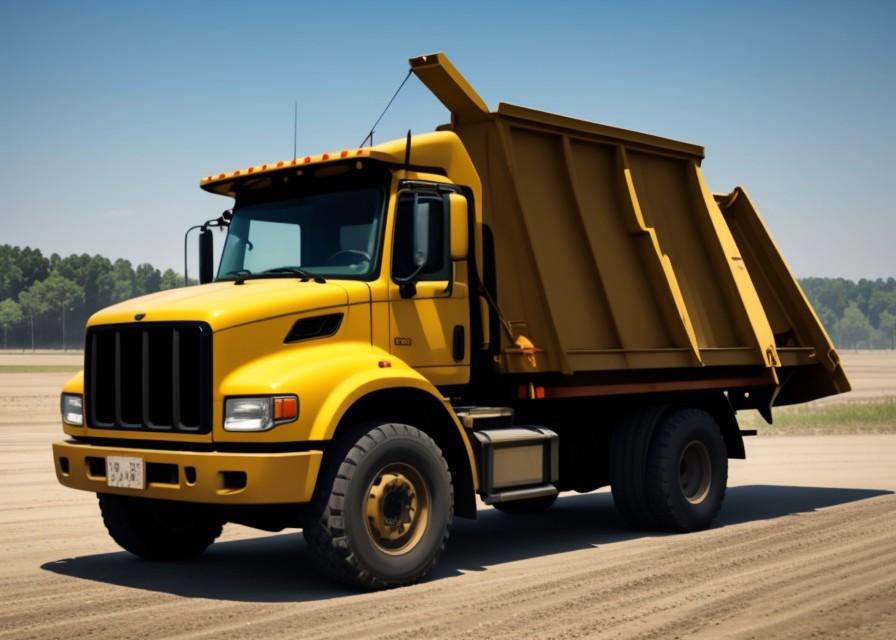
Advantages of Using Dump Trucks
Efficiency in Material Transport
One of the primary advantages of using dump trucks is their efficiency in transporting large quantities of materials. Whether it’s sand, gravel, or demolition debris, dump trucks can move these materials quickly and efficiently. This efficiency translates to cost savings and increased productivity for construction projects, mining operations, and other industries that rely on bulk material transport.
Dump trucks are designed to handle heavy loads, which means fewer trips are needed to transport the same amount of material compared to smaller vehicles. This not only saves time but also reduces fuel consumption and wear and tear on the equipment.
Versatility Across Various Industries
Dump trucks are incredibly versatile and can be used in a wide range of industries. From construction and mining to landscaping and agriculture, these trucks can handle various types of materials and operating conditions. This versatility makes them a valuable asset for businesses looking to maximize their investment in heavy equipment.
In addition to their primary role in transporting materials, dump trucks can also be equipped with specialized attachments and accessories to perform additional tasks. For example, snowplows can be attached to dump trucks for winter road maintenance, while water tanks can be added for dust suppression in construction sites.
Challenges and Limitations
Maintenance Costs
While dump trucks offer numerous advantages, they also come with certain challenges and limitations. One of the primary challenges is the cost of maintenance. Due to the heavy loads they carry and the harsh conditions they often operate in, dump trucks require regular maintenance to ensure their reliability and longevity.
Routine maintenance tasks include engine checks, hydraulic system inspections, tire replacements, and more. The cost of these maintenance activities can add up over time, making it essential for businesses to budget accordingly and perform regular inspections to prevent costly breakdowns.
Environmental Impact
Another significant challenge associated with dump trucks is their environmental impact. Traditional dump trucks are powered by diesel engines, which produce emissions that contribute to air pollution and climate change. Additionally, the fuel consumption of these large vehicles can be substantial, leading to increased operating costs and environmental concerns.
To address these issues, many manufacturers are developing more eco-friendly alternatives, such as electric dump trucks and hybrid models. These vehicles offer reduced emissions and lower fuel consumption, making them a more sustainable option for businesses looking to minimize their environmental footprint.
Choosing the Right Dump Truck
Assessing Job Requirements
When choosing a dump truck, it’s essential to assess your specific job requirements. Consider factors such as the type of materials you’ll be transporting, the distance you’ll need to travel, and the terrain you’ll be operating on. Different types of dump trucks are better suited for specific tasks, so it’s crucial to select a model that meets your needs.
For example, if you need a dump truck for off-road mining operations, an articulated dump truck with a robust suspension system may be the best choice. On the other hand, if you’re working on a construction site with limited space, a standard dump truck with a smaller footprint may be more suitable.
Budget Considerations
Budget is another critical factor when choosing a dump truck. Dump trucks come in various price ranges, depending on their size, capacity, and features. It’s essential to balance your budget with your job requirements to ensure you’re getting the best value for your investment.
In addition to the initial purchase price, consider the long-term costs associated with operating and maintaining the dump truck. Fuel efficiency, maintenance expenses, and potential resale value should all be taken into account when making your decision.
Fuel Efficiency and Environmental Factors
With growing concerns about environmental sustainability, fuel efficiency is an important factor to consider when choosing a dump truck. More fuel-efficient models can help reduce operating costs and minimize your environmental impact.
Additionally, consider the availability of eco-friendly alternatives such as electric or hybrid dump trucks. While these models may have a higher initial cost, they can offer significant long-term savings through reduced fuel consumption and lower emissions.
Dump Truck Maintenance Tips
Regular Engine Checks
Routine engine checks are crucial for ensuring that your dump truck runs smoothly and efficiently. Regularly inspect the engine for signs of wear and tear, and address any issues promptly to prevent more significant problems down the line.
Pay attention to factors such as oil levels, coolant levels, and air filters. Keeping these components in good condition will help maintain optimal engine performance and extend the lifespan of your dump truck.
Hydraulic System Maintenance
The hydraulic system is essential for the operation of the dump bed, so it’s important to keep it in good working order. Regularly inspect hydraulic hoses, cylinders, and fittings for signs of wear or damage. Replace any worn or damaged components promptly to prevent system failure.
In addition to visual inspections, regularly check hydraulic fluid levels and top up as needed. Using high-quality hydraulic fluid can help improve system performance and reduce wear on components.
Tire and Wheel Care
Given the heavy loads they carry, it’s essential to regularly check and maintain the tires and wheels of your dump truck. Inspect tires for signs of wear, such as uneven tread patterns or bulges. Rotate tires regularly to ensure even wear and replace them when necessary.
Proper tire inflation is also crucial for maintaining optimal performance and safety. Underinflated or overinflated tires can lead to reduced traction, increased fuel consumption, and a higher risk of blowouts.
Innovations in Dump Truck Technology
Autonomous Dump Trucks
Autonomous dump trucks are revolutionizing industries like mining by reducing human error and increasing efficiency. These vehicles are equipped with advanced sensors and control systems that allow them to operate without a human driver.
Autonomous dump trucks can navigate complex environments, avoid obstacles, and optimize routes for maximum efficiency. This technology not only improves productivity but also enhances safety by reducing the risk of accidents caused by human error.
Electric Dump Trucks
Electric dump trucks are an eco-friendly alternative to traditional diesel-powered models. These vehicles use electric motors powered by batteries or fuel cells, resulting in zero emissions and lower operating costs.
Electric dump trucks offer several advantages over their diesel counterparts, including quieter operation, reduced maintenance requirements, and lower energy costs. As battery technology continues to improve, electric dump trucks are becoming an increasingly viable option for businesses looking to reduce their environmental impact.
Advanced Safety Features
Modern dump trucks come equipped with advanced safety features designed to protect both operators and bystanders. These features include collision avoidance systems, lane departure warnings, blind-spot monitoring, and more.
In addition to these electronic systems, many dump trucks are also designed with enhanced visibility options, such as larger windows and high-mounted mirrors. These features help operators maintain better awareness of their surroundings, reducing the risk of accidents.
Safety Measures for Operating Dump Trucks
Operator Training
Proper training is essential for anyone operating a dump truck to ensure safety and efficiency. Operators should be familiar with the specific controls and features of their vehicle, as well as best practices for loading, unloading, and driving under various conditions.
Training programs should cover topics such as vehicle inspection procedures, safe driving techniques, load management, and emergency response protocols. Regular refresher courses can help keep operators up-to-date on the latest safety standards and practices.
Routine Safety Inspections
Regular safety inspections can help identify potential issues before they become serious problems. Inspect key components such as brakes, lights, tires, and hydraulic systems regularly to ensure they are in good working order.
In addition to routine inspections conducted by operators, consider scheduling periodic professional inspections by qualified technicians. These thorough assessments can help identify hidden issues that may not be apparent during daily checks.
Proper Load Management
Properly managing the load is crucial for maintaining stability and preventing accidents. Ensure that materials are evenly distributed within the truck bed to avoid unbalanced loads that could cause tipping or loss of control.
Pay attention to weight limits specified by the manufacturer and avoid overloading the truck beyond its capacity. Overloading can put excessive strain on key components such as the engine, transmission system, brakes, and suspension system—leading to increased wear-and-tear or even catastrophic failure.
Environmental Impact and Sustainability
Emissions and Fuel Consumption
Dump trucks are significant contributors to emissions, particularly those powered by diesel engines. These vehicles produce pollutants such as nitrogen oxides (NOx) and particulate matter (PM), which can have adverse effects on air quality and human health. Additionally, the high fuel consumption of dump trucks contributes to greenhouse gas emissions, exacerbating climate change.
To mitigate these environmental impacts, many manufacturers are focusing on improving fuel efficiency and reducing emissions. Technologies such as turbocharging, exhaust gas recirculation (EGR), and selective catalytic reduction (SCR) are being integrated into modern diesel engines to lower their environmental footprint. Additionally, the development of alternative fuels such as biodiesel and natural gas offers more sustainable options for powering dump trucks.
Eco-Friendly Alternatives
As concerns about environmental sustainability grow, there is increasing interest in eco-friendly alternatives to traditional dump trucks. Electric dump trucks, for example, are powered by batteries or fuel cells, resulting in zero tailpipe emissions. These vehicles offer several benefits, including quieter operation, reduced maintenance requirements, and lower energy costs.
Hybrid dump trucks combine traditional internal combustion engines with electric motors to improve fuel efficiency and reduce emissions. These vehicles can operate in electric-only mode for short distances, making them ideal for urban environments where air quality is a concern.
Another promising development is the use of hydrogen fuel cells in dump trucks. Hydrogen fuel cells generate electricity through a chemical reaction between hydrogen and oxygen, producing only water vapor as a byproduct. This technology offers the potential for long-range, zero-emission operation, making it a viable option for heavy-duty applications.
Future Trends in the Dump Truck Industry
Technological Advancements
The dump truck industry is continually evolving, with new technologies being developed to improve performance, efficiency, and safety. One of the most significant advancements is the integration of autonomous driving technology. Autonomous dump trucks are equipped with advanced sensors, cameras, and control systems that allow them to navigate complex environments without human intervention. This technology not only enhances productivity but also reduces the risk of accidents caused by human error.
Another exciting development is the use of telematics and data analytics to optimize dump truck operations. Telematics systems collect data on vehicle performance, fuel consumption, and driver behavior, providing valuable insights that can be used to improve efficiency and reduce costs. Predictive maintenance algorithms can analyze this data to identify potential issues before they lead to breakdowns, minimizing downtime and repair expenses.
Market Growth Projections
The global dump truck market is expected to experience significant growth in the coming years, driven by increased infrastructure development, mining activities, and urbanization. Emerging economies in regions such as Asia-Pacific and Latin America are investing heavily in construction projects, creating a strong demand for dump trucks.
Additionally, the shift towards more sustainable practices is driving the adoption of eco-friendly dump trucks. Governments and regulatory bodies are implementing stricter emissions standards, encouraging businesses to invest in cleaner technologies. As a result, the market for electric and hybrid dump trucks is expected to expand rapidly.
Dump Trucks in Popular Culture
Movies and TV Shows
Dump trucks have made appearances in various movies and TV shows, often symbolizing hard work, industry, and ruggedness. For example, in the animated film “Cars,” the character “Mack” is a lovable dump truck who plays a crucial role in helping the protagonist achieve his goals. Similarly, in construction-themed children’s shows like “Bob the Builder,” dump trucks are depicted as essential members of the construction team, teaching young viewers about teamwork and problem-solving.
In action movies and disaster films, dump trucks are often used in scenes involving large-scale construction projects or emergency response efforts. Their imposing size and powerful capabilities make them ideal for dramatic sequences that highlight their strength and versatility.
Toys and Models
For kids (and some adults), toy dump trucks are a popular choice that sparks imaginations about construction adventures. Brands like Tonka and LEGO offer a wide range of dump truck toys that allow children to engage in imaginative play while learning about construction and engineering.
Collectible model dump trucks are also popular among hobbyists and enthusiasts. These detailed replicas often feature realistic designs and movable parts, making them prized additions to any collection. Some manufacturers even offer limited-edition models that commemorate historical dump truck designs or iconic vehicles from popular media.
Conclusion
Dump trucks play a crucial role in modern industry, from construction to mining and beyond. Their versatility, efficiency, and evolving technology make them indispensable tools for transporting bulk materials quickly and safely. Whether you’re considering purchasing one for your business or simply fascinated by these massive machines, understanding their workings can provide valuable insights into their importance in our daily lives.
As we look to the future, advancements in technology and a growing emphasis on sustainability are set to transform the dump truck industry. Autonomous driving systems, electric powertrains, and advanced safety features are just a few of the innovations that promise to enhance performance while reducing environmental impact. By staying informed about these trends and developments, businesses can make informed decisions that align with their operational needs and sustainability goals.
In summary, dump trucks are more than just vehicles; they are essential components of our industrial landscape that drive progress and innovation. From their humble beginnings as horse-drawn carts to the sophisticated machines of today, dump trucks continue to evolve and adapt to meet the demands of an ever-changing world. Whether you’re watching them in action on a construction site or collecting miniature models at home, there’s no denying the enduring appeal and significance of these mighty machines.

